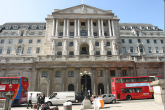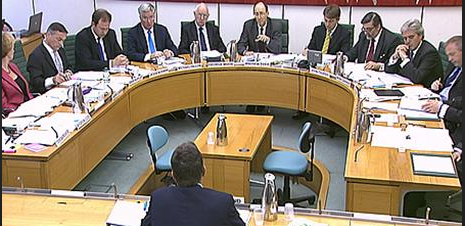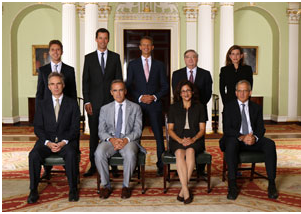Forexlive guest economist John Hearn has kindly taken time out to offer his latest thoughts 28 Dec
Check all of John's blogs here and follow him on Twitter.
As always we welcome your comments/questions.
Some questions the Treasury Select Committee should ask when investigating the Bank of England`s monetary policy
Below are a series of questions I would like asked when the Bank is investigated by Andrew Tyrie`s Treasury Select Committee. After each question is the answer I expect the Bank of England (BofE) to give followed by the answer I would give. In italics are references to articles on my blog that will explain each of my answers in more detail.
Q: Other than interest rates is there an alternative way to manage monetary demand and achieve the inflation target?
BofE answer: No, the manipulation of interest rates is the only way to achieve our targets.
My answer: Yes it was discussed in detail in the 80s and is monetary base or cash controls. It frees up interest rates and imposes significant discipline on the BofE and the Treasury`s budget deficit policy. These are explained in more detail on my blog:-
"Understanding monetary policy: a synthesis of the old and the new"
"The best way to complete monetary reform with maximum impact and minimum change"
Q: If we asked you only to achieve the inflation target can you do that?
BofE answer: No because of external factors such as the exchange rate and cost push pressures that influence prices.
My answer: Yes the BofE has total control over the supply of sterling and aggregate monetary demand and therefore is the sole cause of inflation. Changes in the exchange rate are not causes of inflation, they are symptoms of a previous monetary expansion. Inflation, by definition, is more units of money used in the same number of transactions and rises in costs cannot increase the units of money in circulation.
Q: Are you not misleading people in your Inflation Report when you state the current rate of inflation and highlight individual prices as if they are the cause of inflation?
BofE answer: We report the current rate of inflation and identify those prices which have contributed most to that rate. We do not say that these price rises are the cause of inflation.
My answer: That was exactly the answer I received from a member of the Monetary Policy Committee who then pointed out that it is newspapers that misinterpret this link in their headlines. I then said that this misunderstanding could be easily overcome if the Bank reminded people that their monetary policy was the sole cause of inflation. This point is one of:-
"The four fallacies of the coming economic apocalypse"
Q: If we asked can you boost employment and economic growth with your monetary policy?
BofE answer: Yes, if there is an output gap and idle resources in the economy then an expansionary monetary policy will achieve employment and growth.
My answer: No, output gaps cannot be closed by manipulating aggregate monetary demand. Additional reading:-
"Are demand management policies the solution or mass delusion?"

Q: Is there a relationship between inflation and levels of employment?
BofE answer: Yes, there is a functional relationship expressed in the Phillips Curve and, as long as you are prepared for more inflation, you can have more employment.
My answer: No,the original Phillips Curve did not show this relationship, it was a function between employment levels and changes in wages not prices. There is no evidence of said relationship as explained in:-
"What really happened in the 70s"
"Professor A W Phillips would turn in his grave if he knew how the Keynesians had corrupted his curve"
Q: Has the Bank of England pension scheme recognised that RPI is the better measure of inflation against which to index link its pension?
BofE answer: My predecessor Mervyn King explained that the Bank`s pension is a private scheme and he would not want to disadvantage its members by linking it to CPI.
My answer: The Bank has recognised that because CPI is a geometric average it undervalues the rate of inflation by more than 1% and when compounded this will mean a significant loss over the life of a pension. RPI is an arithmetic average and a truer measure of inflation. This is explained in:-
"Which is the best measure of inflation and changes in the value of money?"
Q: There are many different rates of interest in the economy. Does Bank Rate affect all of them?
BofE answer: Yes, by adjusting Bank Rate and through, what is called, the transmission mechanism all rates will be pushed up or pulled down
My answer: No there is a structure to interest rates determined by risk, amount and term and only secured loan rates (mainly mortgages) have been significantly reduced by a low Bank Rate. Most other rates are unchanged or have actually been raised: see unsecured credit card and personal loan rates. A lower Bank Rate has distorted the structure of interest rates and created unsustainable asset bubbles. This is further explained in:-
"A reappraisal of interest rates and market interest rates"
"The bubble will burst (just don`t ask me when)"

Q: Has the policy of Forward Guidance (FG) been successful?
BofE answer: Yes of course, we have always said that our plans are dependent upon the current state of the economy and we must always be adaptable to unexpected changes and shocks.
My answer: Forward Guidance was a mistake from the start and was seen to be so early in proceedings when unemployment fell below 7% and was said to trigger a rise in interest rates. The DSGE model predicted that this would not happen until 2018 and embarrassingly it happened months after FG was set up. Before the Brexit decision FG was that interest rates will have to rise if we vote to leave and then promptly lowered rates when it happened. Arguably FG policy has created more instability and uncertainty not less.
Q: Has the policy of Quantitative Easing (QE) been successful?
BofE answer: Yes indeed it saved us from deflation after the Financial Crisis and is providing necessary liquidity to the banking system.
My answer: I agree that it saved us from deflation. As I have already explained this is the one thing that the BofE can do. The mistake is for it to be a transparent policy which is misunderstood by most. In fact it is just the expansionary side of Open Market Operations (OMOs) and, OMOs are more than capable of doing the same job in secret with no pointless misleading arguments. This is explained in:-
"Understanding and misunderstanding QE"
Q: The Bank of England always helped manage government (over)spending by causing that unconstitutional tax inflation to reduce the real value of debt. Without inflation do you see low interest rates as an unconstitutional tax on savers?
BofE answer: No, the low interest rate policy is necessary to help boost employment and growth during a period of very low inflation. For the last 50 years there have been significant periods where savers have received large negative real rates of interest. At present these rates are almost positive again.
My answer: Someone has to pay for government (over)spending. In the past it has been the current taxpayer or the future taxpayer, but now those fortunate enough to have savings are being asked to contribute some or all of their earnings to support debtors.

Q: Has the BofE had any meetings with the Federal Reserve, European Central Bank, Bank of Japan and any other Central Banks to consider a concerted move on interest rates as this would seem to be a sensible way of avoiding volatility in forex markets?
BofE answer: We are talking all the time, but all the Central Banks see themselves facing a whole range of problems that cannot be solved by a simple agreement on interest rate policy.
My answer: The Fed has tested the water and seen what impact small quarter point moves are having on foreign exchange markets. Behind closed doors they all know that a concerted move is the only way to keep forex markets stable and minimise the damage that will be done with a return to market rates of interest, but unfortunately they cannot agree on timing and are frightened to move up alone.
However their concern about damage should only be directed to the bubbles in asset markets, much of the real economy will be unaffected as things normalise and productive investment picks up again.
Q: Is the Bank likely to take rates negative in the foreseeable future?
BofE answer: This is unlikely as the UK economy is weathering the headwinds better than most countries, but there may be further shocks ahead and we are always prepared to do whatever is necessary to protect the UK economy in an uncertain world.
My answer: Going negative is the worst possible response to a failed monetary policy backed by the wrong economic theory. Although not understood by most economists it is the distorting low interest rate policy that is moving us towards the next financial crisis and when it hits those in power will only see one option which is to go even lower.
They do not understand and cannot see that the only solution to preventing the next crisis is to raise interest rates now, suffer a short sharp shock before returning to higher growth and prosperity.
Q: Have you read "Decades of mistakes: What the Bank of England got wrong in the 1920s, 1970, 1980, 2000s & 2010s"?
BofE answer: No
Postscript:
I suppose the real worry for me is that in the last financial crisis banks were in the foreground and Central Banks in the background. Now this situation seems to have been reversed with Central Banks taking centre stage and banks still licking their wounds from the last crisis, but we all know how difficult it is to get Central Banks to accept the blame for their mistakes, which is why we must ask the right questions.
John Hearn 26/12/16



